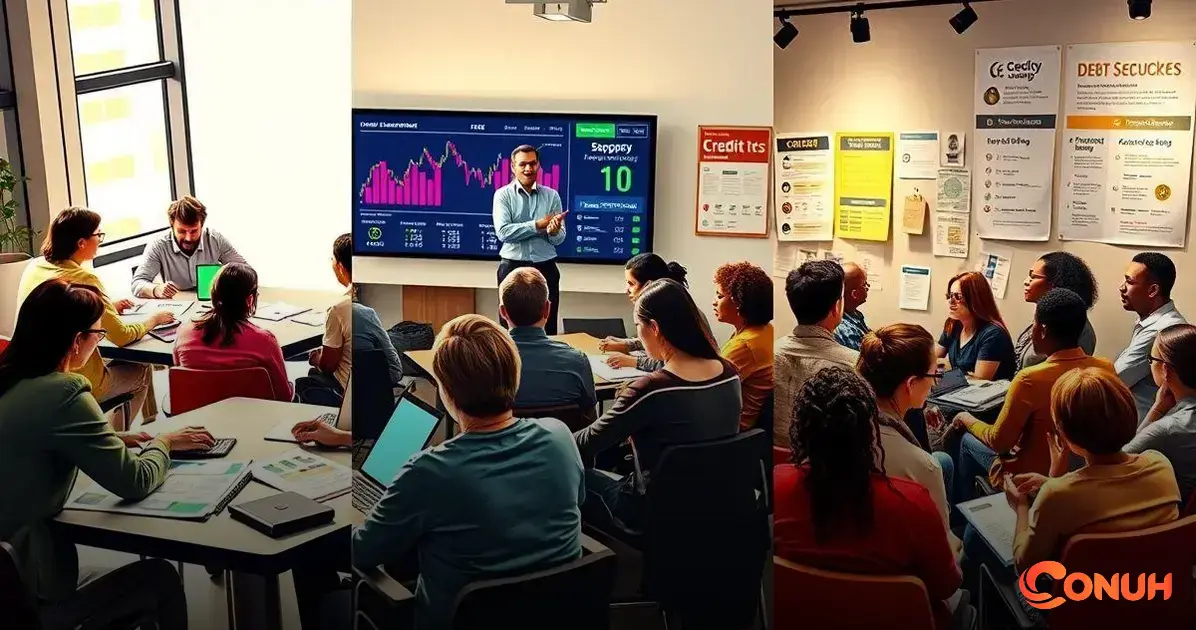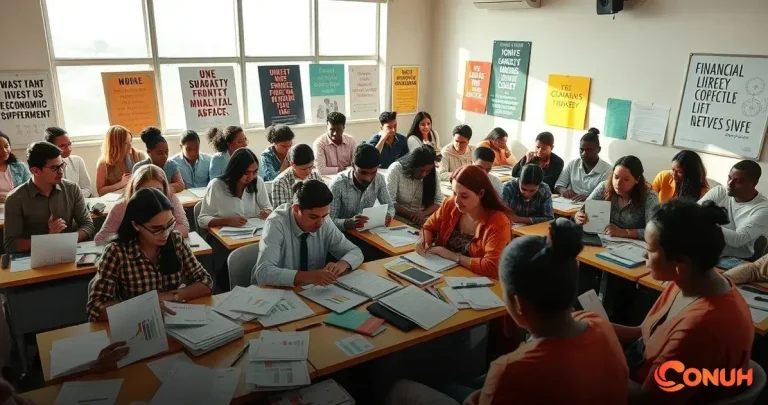ADVERTISEMENT
Financial literacy is essential for making informed money decisions. Financial literacy courses empower individuals with knowledge and skills. These courses can enhance your financial capabilities.
The need for financial education has never been greater. Understanding personal finance can lead to better savings, investments, and overall economic wellbeing. Enhancing financial knowledge also promotes responsible money management.
ADVERTISEMENT
Are you ready to take control of your financial future? Keep reading to discover the best financial literacy courses that can change your life!
What Are Financial Literacy Courses?
Financial literacy courses are designed to teach individuals about managing money effectively. These courses cover essential topics like budgeting, saving, investing, and understanding credit. Participants learn the skills needed to make smart financial decisions and improve their overall economic health.
In a financial literacy course, learners explore different aspects of finance through engaging lessons and practical exercises. The goal is to provide students with a solid understanding of how money works and how to use it to achieve personal goals. Many courses also include real-life scenarios to help students apply what they learn.
Financial literacy courses are available in various formats, such as online classes, workshops, and community programmes. These courses are suitable for people of all ages, from students to adults looking to enhance their financial skills. Investing time in these courses can unlock opportunities for financial growth and better decision-making.
Benefits of Financial Literacy Courses
The benefits of financial literacy courses are immense. First and foremost, they empower individuals to gain confidence in managing their money. By learning about budgeting and saving, people can make informed decisions that lead to financial stability.
Another significant benefit is improved decision-making. With knowledge from financial literacy courses, individuals understand the differences between needs and wants. This understanding helps them prioritize their spending and avoid unnecessary debt, ultimately leading to a better financial future.
Furthermore, financial literacy courses provide valuable skills that can enhance career opportunities. Employers often seek candidates who are financially savvy, as this can reflect strong analytical abilities and responsibility. Overall, these courses unlock new paths and provide tools for lifelong financial success.
Types of Financial Literacy Courses

There are several types of financial literacy courses available to suit different needs. One popular type is the basic budgeting course, which teaches participants how to track their income and expenses. This course helps individuals create a budget that works for them, laying the foundation for better financial habits.
Another common type is investment courses. These courses introduce essential concepts about stocks, bonds, and other investment vehicles. They can range from beginner to advanced levels, helping attendees learn how to grow their wealth over time through smart investments.
Additionally, courses focused on credit management are essential for understanding credit scores, loans, and debt. These courses provide valuable knowledge on how to manage credit responsibly and improve financial health. With different types of financial literacy courses, everyone can find the right fit to enhance their financial understanding.
How to Choose the Right Course
Choosing the right financial literacy course starts with understanding your personal goals. Ask yourself what you want to learn. If you’re unsure of your financial situation, a budgeting course might be the best starting point. For those looking to invest, an investment course will cater to your needs better. Knowing your goals helps narrow down your options.
Next, consider the format that works best for you. Some people prefer online courses where they can learn at their own pace, while others enjoy live classes for interaction. Think about your learning style and schedule. Also, check if the courses offer flexible timings or recorded sessions.
Lastly, read reviews and ratings from past participants. Feedback can provide insight into the quality and effectiveness of the course. Ensure the course is offered by a trusted provider with experienced instructors. By doing this research, you can choose a course that aligns with your needs and supports your financial growth journey.
Top Online Financial Literacy Courses
One of the top online financial literacy courses is Financial Peace University by Dave Ramsey. This course covers budgeting, debt management, and saving strategies. Participants appreciate its practical tips and step-by-step approach, making it easy to apply what they learn in real life.
Another great option is Coursera’s Financial Literacy for Teens. This course helps young learners understand the basics of managing money while preparing for future financial responsibilities. It is interactive and engaging, making financial concepts approachable and fun for teens.
Lastly, consider Khan Academy’s Personal Finance course. This free resource teaches a range of topics, including saving, investing, and credit. The lessons are straightforward and suitable for all ages, making financial literacy accessible for everyone.
Real-life Success Stories

One inspiring success story comes from Jane, who took a financial literacy course to improve her money management skills. Before the course, she struggled to keep track of her expenses and often found herself in debt. After learning budgeting techniques and how to save effectively, Jane managed to pay off her credit card debt and even created a savings plan for her future.
Another example is Mark, a college student who completed an online investment course. With newfound confidence, he began investing in stocks. Mark started small, but his careful approach and knowledge from the course helped him grow his investment portfolio significantly. Now, he plans to use his earnings to fund his education further.
Lastly, we have Sarah, a single mother who took a credit management course. She was unsure about her credit score and how to improve it. By following the course’s advice, Sarah learned how to manage her debts and increase her credit score. Now, she is proud to say she qualifies for better loans and can provide a more secure life for her family.
Cost of Financial Literacy Courses
The cost of financial literacy courses can vary widely. Some basic online courses are available for free, which makes them accessible to everyone. These free options often provide essential skills and knowledge without any financial burden. However, if you want in-depth courses with more resources, these may have a fee.
Many paid courses range from $50 to several hundred dollars, depending on the provider and the course length. For example, a comprehensive course that includes personal coaching or advanced topics often costs more. Make sure to check what’s included in the price, such as materials or support.
Investing in a financial literacy course is generally worthwhile. The skills gained can save you money and help you make better financial decisions in the long run. Evaluating your budget before choosing a course allows you to find one that matches your financial situation while still providing valuable learning experiences.
Financial literacy courses play a crucial role in helping individuals understand their finances better. By learning about budgets, savings, and investments, participants gain the knowledge needed to make informed decisions. This education helps build a strong foundation for a secure financial future.
Many individuals find that taking a financial literacy course has a positive impact on their lives. It enables them to manage their money more effectively, reducing stress associated with financial uncertainty. Participants often report feeling more confident in their financial choices after completing these courses.
Furthermore, financial literacy courses can lead to better opportunities in both personal and professional life. With improved financial knowledge, people can negotiate better salary packages and manage investments wisely. This knowledge not only empowers individuals but can also lead to a brighter financial future for their families.







